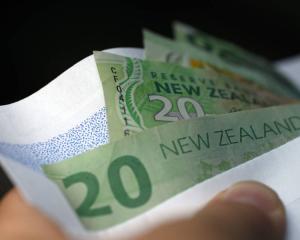The impact of the high dollar, tourism downturn and the United States credit crunch has started to hurt four of the Dunedin City Council-owned or part-owned companies.
Three of the companies - Taieri Gorge Railway, Dunedin International Airport and Citibus - yesterday reported losses before tax for the six months ended December 31.
City Forests reported an improved profit before tax for the period but the result was helped by a $3.5 million revaluation of the forest estate.
Without the revaluation, the company would have made a loss of about $500,000.
Dunedin City Holdings released the company results at a media conference with chairman Paul Hudson commenting that the New Zealand forestry industry had operated through a very tough period of unfavourable exchange rates and excessive freight costs.
City Forests responded by reducing its log production, which resulted in operating revenue falling.
The improved surplus was achieved by new accounting rules through the improved forest valuation, he said.
Of the remaining companies, Delta Utility Services reported a reduced profit before tax with only Dunedin City Treasury and Aurora Energy reporting improved profits.
City Holdings might not have been able to pay as much cash to the DCC in the period without Aurora's $12.8 million profit, up $1 million on the previous corresponding period (pcp).
The City Holdings accounts showed a $4.5 million net interest paid to the council compared with $509,000 in the pcp and a $2 million dividend compared with a $7 million dividend in the pcp. The total paid to the council in the period was $6.5 million compared with $7.5 million in the pcp.
Mr Hudson told the Otago Daily Times the increased interest payment was a timing issue and followed a request from the council for the interest payment.
It could mean that dividends might not be paid to the council in future. Instead, the interest on the $103 million advance would be paid by City Holdings with the possibility of dividends making up the balance of cash paid.
‘‘This year, we have started reporting the figure ‘surplus before shareholders' interest', rather than just the surplus. This is because the Dunedin City Holdings group and its shareholder, the DCC, have altered the way which they will manage distributions between sections of the overall group.''
In the past, distributions of cash between the City Holdings group and the DCC had been made predominantly by dividends, he said.
In the future, dividends would be reduced by the extent that net interest payments on the shareholders' advance were increased.
That change in policy altered the look of the accounts and the income statement, in particular.
Analysis of the City Holdings accounts showed that total revenue for the group rose nearly 2% to $90.5 million. The surplus before tax but before one-off accounting adjustments fell by 30% to $7.6 million.
The net surplus paid to council on advance rose marginally to $12 million.
Mr Hudson said it was satisfying to see the group as a whole continued to generate good surpluses even under economic conditions that had weakened.
High exchange rates, increased fuel costs, key offshore economies under some stress and some marked changes in the tourism industry had provided a challenging business environment.
‘‘We are fortunate, therefore, to have a good, diversified portfolio of companies that can maintain, over time, a steady stream of earnings.''
Ongoing building development in the Central Otago region had again underpinned an excellent result from the electricity distribution business, he said. Wide-ranging development in the region had continued to create strong demand for new connections.
Aurora Energy's results had exceeded expectations. Delta, which often worked alongside Aurora, had succeeded in expanding its activity in the busy central region though the acquisition of Lakes Contract Services, of Frankton.
Citibus and Taieri Gorge continued to negotiate their way through a fickle tourism market. Incoming tourist numbers to the South Island had declined, Mr Hudson said.
High fuel costs had hurt the margins of both companies, but particularly that of Citibus, which in servicing the local Dunedin commuter market, had seen no increase in fares.
Both bus operators in Dunedin were facing investing heavily in capital expenditure to maintain a suitable fleet standard.
Citibus was undertaking a replacement programme but there were issues to be addressed to ensure the operators had the capital available to spend on the upgrade, he said.
Since 1994, there had only been two fare price increases.
Looking ahead, Mr Hudson said the City Holdings board remained confident it would produce a satisfactory trading result for the full financial year.












